For Slovak comedian František Košarišťan, who is better known as Fero Joke, Tepláreň had always been a place where he – and many others – felt safe and accepted for who he was.
At Tepláreň, one of Bratislava’s two LGBT+ bars, the entertainer who proudly identifies as a gay Catholic also started off his career by making people laugh. This cosy bar has now fallen into silence and dozens of candles and flowers lie outside the venue following the murder of two members of the LGBT+ community.
“This culture of death, or hatred against minorities, is a consequence of the behaviour of politicians in parliament who shamelessly insult homosexuals and lie publicly [about them],” outraged Košarišťan said.
On the evening of October 12, a 19-year-old Bratislava grammar school student targeted and shot dead two young LGBT+ people – university student and Tepláreň bartender Matúš Horváth and visual merchandiser Juraj Vankulič – outside the bar situated near the city centre with his father’s legally owned gun. Another customer, a woman, was also injured in the shooting.
“There could have been more people in the bar,” Tepláreň owner Roman Samotný said. The bar opened two hours before the gunman carried out the attack. He had waited outside, observing Tepláreň for at least half an hour before his attack.
Several hours after the shooting, the attacker was found dead in a street near the main railway station. He is believed to have shot himself dead.
The gunman who has been identified as Juraj K., the son of a politician from the non-parliamentary far-right party Vlasť (Homeland), published online a white supremacist manifesto, in English, before the shooting, expressing his wish to carry out further attacks on different groups and in different places. Eduard Heger, head of the conservative government, was the gunman’s initial target.
The police are investigating the deadly shooting as premeditated murder, but do not rule out reclassifying it as terrorism.
The public reacted strongly to the killings, with an estimated 15,000-20,000 people marching from Tepláreň to one of the Bratislava squares two days after the attack to condemn hate against the LGBT+ community in Slovakia, a rather conservative EU country with a strong presence of the Roman Catholic Church. Gatherings were also held in other Slovak towns and outside the country.
“Many say LGBT+ people are an ideology,” Samotný told the Bratislava crowd on October 14. “But I saw the blood of my friends on the pavement. I saw their shot bodies, no ideology.”
Despite the shooting and the public’s immediate support, the LGBT+ community remains sceptical about seeing any potential improvements to the lives of members of the community, since the atmosphere of hate against them has, they argue, been nurtured by many groups, including politicians in power or in parliament, for years.
Politicians blamed for spreading hate
President Zuzana Čaputová echoed many in the LGBT+ community when she said that the hate crime was the result of animosity that had been “fuelled for a long time by the stupid and irresponsible statements of politicians”.
“This hatred took innocent human lives. Stop it before it costs more,” Čaputová called on her fellow politicians in her first reaction to the crime. A video of the president embracing the owner of Tepláreň at the scene of the murders, both in tears, has been widely shared on social networks.
Čaputová later walked at the front of the march against hate, organised by LGBT+ organisations on Friday, and apologised to the victims and their bereaved from the stage.
But on the Slovak political scene, her attitude has been the exception rather than the rule. And as president, her role is symbolic and representative, and does not have the executive power to change laws. In a gesture of solidarity, the Presidential Palace flew the rainbow flag alongside the Slovak and the European flags. Just this summer, some of the Slovak lawmakers – a far-right MP who made it into parliament on the slate of the ĽSNS, and an MP of the ruling OĽaNO party of Prime Minister Heger – wanted to push through a ban on rainbow flags on official buildings.
Slovakia’s political structures have always been negative or, at best, indifferent to the situation of the LGBT+ community. As a result, Slovakia is one of the few remaining EU member states that does not legally recognise same-sex partnerships.
Slovakia’s Inakosť (Otherness) Initiative, partnering with like-minded organisations from five other EU countries within the R.I.S.E. project, in 2021 found that Slovakia is among the few remaining countries in the EU that does not recognise same-sex partnerships in any form (the others are Latvia, Lithuania, Poland and Romania). The authors of the report pointed out that the current constitutional provision labelling marriage as a unique bond between a man and a woman, inserted into the constitution in 2014, represents a huge obstacle to the passage of any legislation that would make the lives of same-sex couples easier.
Under the current government, there were no expectations any positive change would come for same-sex couples; observers have pointed out that the 2020 election has produced the most conservative parliament in Slovakia’s 30-year history.
Prime Minister Heger is one of these conservative politicians. Before the election, he was part of the informal group Christian Candidates that pledged, among other things, not to introduce the registered partnership for LGBT+ people. After his initial reaction that nobody should be in danger because of their “way of life”, Heger apologised to the LGBT+ community for using inappropriate words.
On Friday night, he marched with the crowd against hate, carrying a rainbow flag handed to him on the spot by an LGBT+ rights activist Hana Fábry. Heger confirmed earlier that the murderer previously posted a selfie in front of the block of flats where he lives with his family and was reportedly on the murderer’s list.
Of the three highest constitutional officials, only Speaker of Parliament Boris Kollár did not attend the march. His party, Sme Rodina, ran for parliament for the first time in 2016, mostly on an anti-migration platform, but Kollár also belonged to the politicians who used denigrating language about LGBT+ people. Derogatory statements were in the past repeated by politicians across the political spectrum, including former prime ministers Robert Fico and Igor Matovič.
Negative stances towards LGBT+ people have also been heard from many representatives of Slovakia’s churches in the past. One notable example is a pastoral letter of the Catholic bishops that was read out in churches across Slovakia before Christmas of 2013. In it, the bishops called people advocating for gender equality and LGBT rights as adherents of the “culture of death”.
Two years later, in 2015, the Catholic Church called on people, in another pastoral letter, to support the referendum on the family, organised by the Alliance for Family civic organisation and targeted against the LGBT+ community. The referendum failed in the end.
Forensic psychologist Anton Heretik said in an interview with Radio Expres after the attack that he hoped the murders would prompt some action to improve the position of LGBT+ people in Slovak society. “Slovakia is one of the few countries where homophobia is part of some sort of lifestyle of many important representatives,” he accused.
Life partnerships and a refuge
Only two among the relevant political parties have come up with proposals to anchor same-sex partnerships in the Slovak legal system, or with other minor improvements to the lives of LGBT+ couples in Slovakia – the Freedom and Solidarity (SaS) party, which is now in opposition after leaving the coalition, and the non-parliamentary Progressive Slovakia (PS).
The MP Tomáš Valášek, who is a member of PS, failed with his attempt to introduce registered partnerships last year. In August this year, SaS, prior to departing the government, filed a set of draft amendments to parliament that would effectively introduce life partnerships. In the form of a binding notary deed, any couple regardless of gender would be able to agree on practical issues like inheritance rights, joint co-ownership, and the right to share health and other personal information.
After the murders outside Tepláreň, several parliamentary parties, including the coalition parties OĽaNO and Sme Rodina, indicated they could support the proposal. The leader of the most popular party Hlas, the former prime minister Peter Pellegrini, told the public-service broadcaster RTVS on October 16 that the attack was a wake-up call for society and their party will definitely support the proposal of SaS.
“And then let us go further and discuss whether Slovak society is willing to accept registered partnerships, too,” Pellegrini said. “For now, in my opinion, it is not.”
The attack left the LGBT+ community in shock, but they stressed in their reactions that they have lived in fear and experienced verbal and physical violence for some time.
As many as 77 percent of same-sex couples are always or often afraid of holding hands in public, according to data from the Fundamental Rights Agency of the EU. One in five trans and intersex people in Slovakia said they were physically or sexually attacked in the five years leading up to the survey.
In the atmosphere of fear that LGBT+ people describe as ever-present in their lives, many of the community described the bar, one of the few in the Slovak capital, as a home and a haven. That was the case for the two murdered people, too.
“They used to go to Tepláreň because it is a refuge for many young people who are looking for solid ground under their feet. They fail to find it elsewhere, because this country is not favourable to them. This country systematically rages against them,” Samotný said in an interview with Sme.
Ľuboš Janák, a 26-year-old native Bratislavan, does not hide that he is gay. As an actor who performs in front of people, he says it is important to him “to be true to the people”. But he says he does not talk about his sexual orientation if he does not need to, and admits that fear is a factor, increasingly, as he grows older. He confirms that he has never felt safe in Bratislava.
“Every day I live in fear that someone will beat or kill me or my loved one just because they do not like the way we look,” he wrote on his Facebook page last year.
The worst incident he has experienced was an attack in a small park in central Bratislava, close to his university. A group of men approached him and his friend, shouting abuse and asking them, among other things, who they voted for. The attackers were proud to share that they were voters of the neo-fascist ĽSNS party.
“What surprised me the most was that when I ran to the nearby café to ask for help, they just mocked me for being scared,” he said.
Calls to end the silence
People from within the community describe the silence and indifference as harmful, too.
“We are silent when people are attacked at bus stops and when they are insulted on the bus. Now I am talking not only about LGBT+ people, but also about Roma, Jews, Ukrainians, women and other minorities. We keep silent and let evil grow,” Samotný told Sme.
The attack has increased the fear within the community, but also determination to bring about change. The Inakosť Initiative called on the government to take measures to improve the position of LGBT+ people in Slovakia.
“It’s now up to all society to finally stop the trend of growing hatred towards LGBT+ people,” said Martin Macko, head of the initiative.
The most that has come from the political class so far has been the repeated apologies from President Zuzana Čaputová.
“It is not you who should feel threatened. Not you who do not belong here. It is hatred and intolerance that does not belong in Slovakia,” she told the LGBT+ community in a Facebook post.
This story was produced in partnership with Reporting Democracy, a cross-border journalism platform run by the Balkan Investigative Reporting Network.



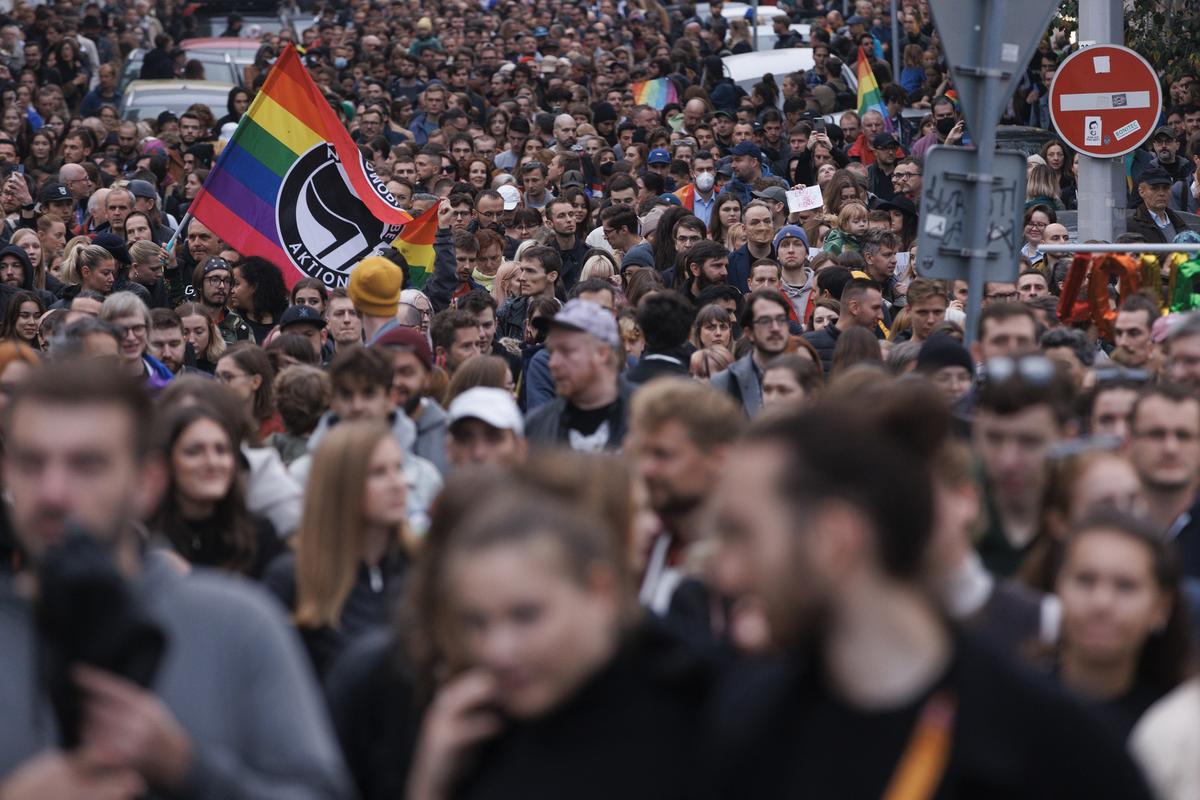 March in support of LGBT+ community in Bratislava on Friday, October 14, 2022. (source: SITA)
March in support of LGBT+ community in Bratislava on Friday, October 14, 2022. (source: SITA)
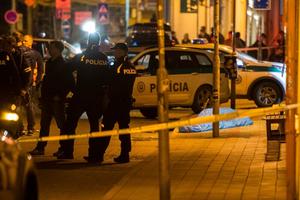
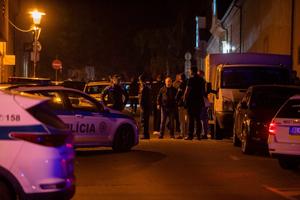
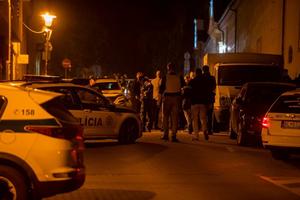
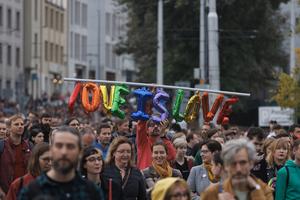
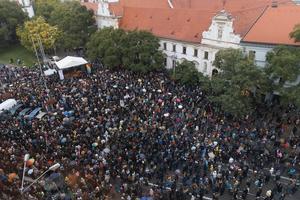

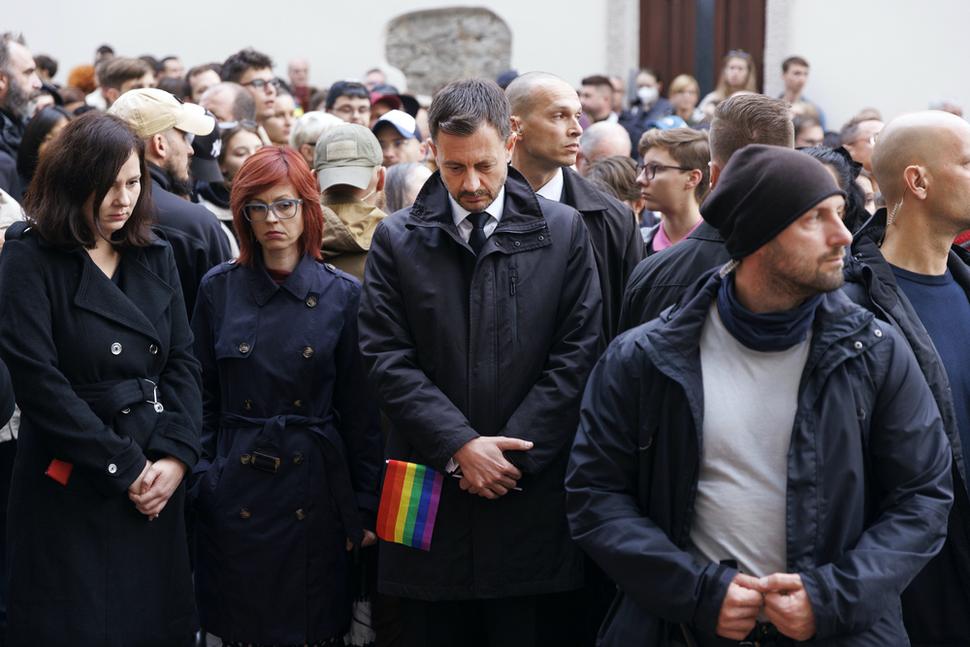 PM Eduard Heger attends the march against hate in Bratislava. (source: TASR)
PM Eduard Heger attends the march against hate in Bratislava. (source: TASR)
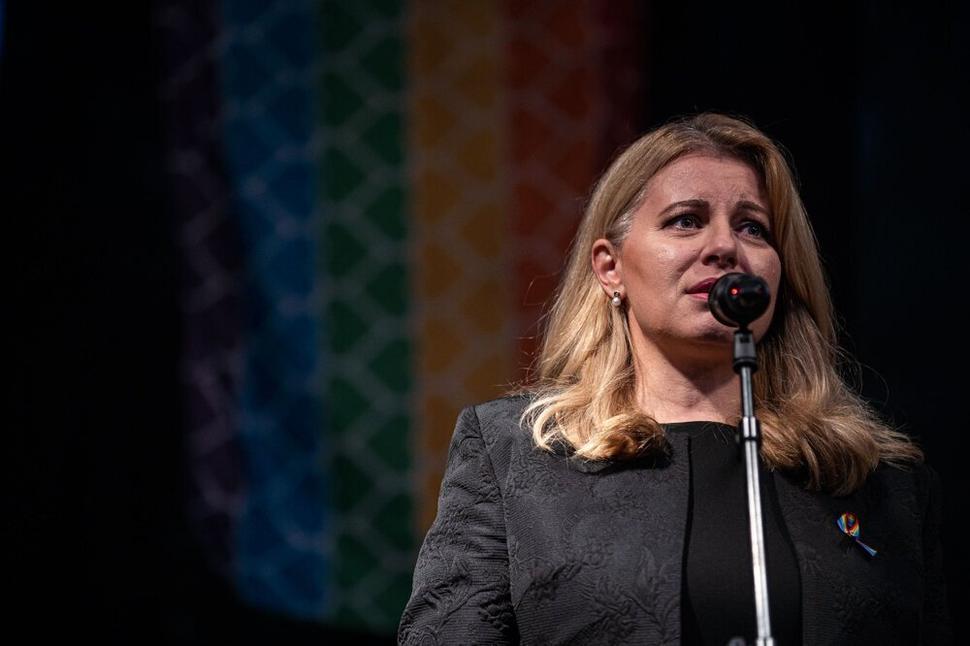 President Zuzana Čaputová speaks to the crowd. (source: Sme - Marko Erd)
President Zuzana Čaputová speaks to the crowd. (source: Sme - Marko Erd)
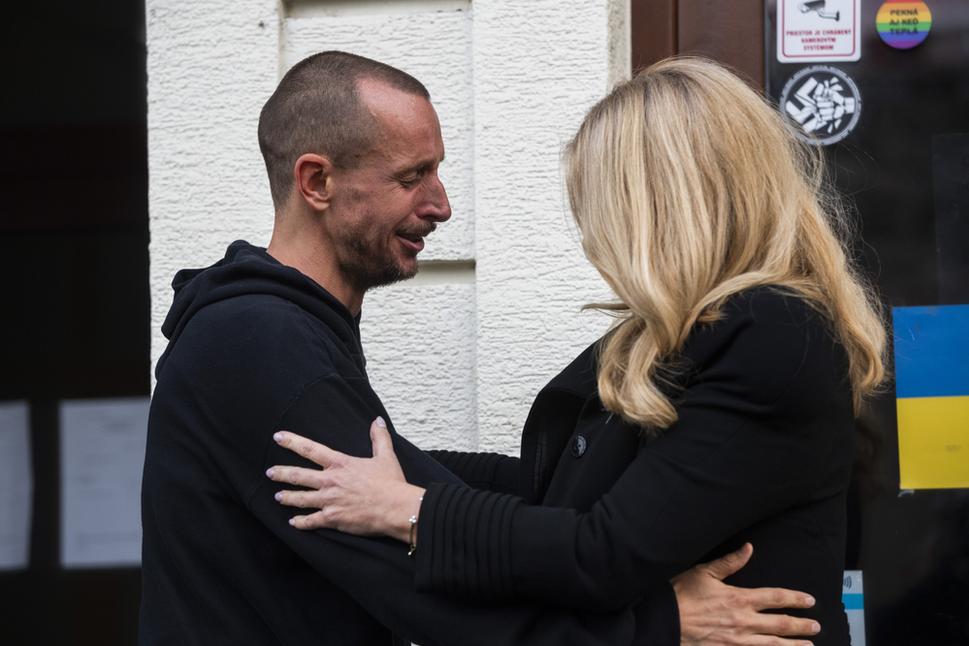 Tepláreň owner Roman Samotný and President Zuzana Čaputová. (source: TASR)
Tepláreň owner Roman Samotný and President Zuzana Čaputová. (source: TASR)